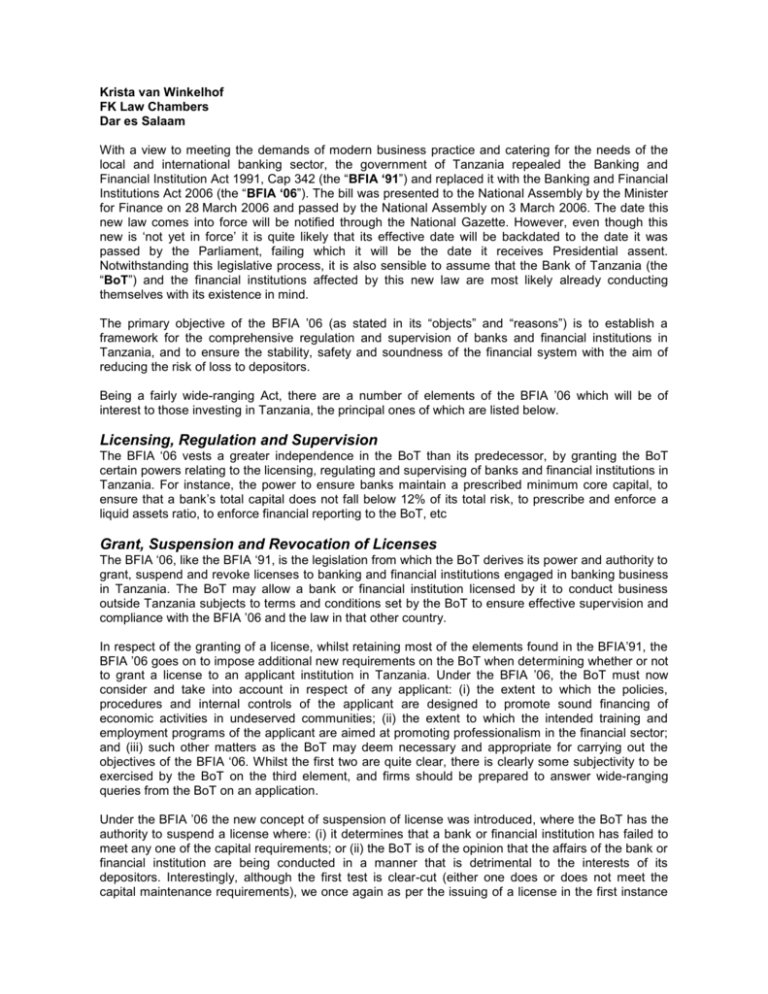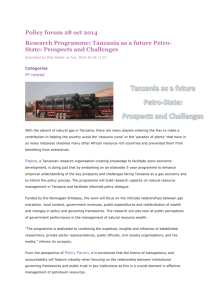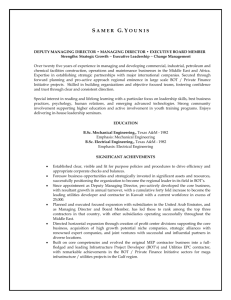New Banking Act in Tanzania (by FK Law Chambers)
advertisement

Krista van Winkelhof FK Law Chambers Dar es Salaam With a view to meeting the demands of modern business practice and catering for the needs of the local and international banking sector, the government of Tanzania repealed the Banking and Financial Institution Act 1991, Cap 342 (the “BFIA ‘91”) and replaced it with the Banking and Financial Institutions Act 2006 (the “BFIA ‘06”). The bill was presented to the National Assembly by the Minister for Finance on 28 March 2006 and passed by the National Assembly on 3 March 2006. The date this new law comes into force will be notified through the National Gazette. However, even though this new is ‘not yet in force’ it is quite likely that its effective date will be backdated to the date it was passed by the Parliament, failing which it will be the date it receives Presidential assent. Notwithstanding this legislative process, it is also sensible to assume that the Bank of Tanzania (the “BoT”) and the financial institutions affected by this new law are most likely already conducting themselves with its existence in mind. The primary objective of the BFIA ’06 (as stated in its “objects” and “reasons”) is to establish a framework for the comprehensive regulation and supervision of banks and financial institutions in Tanzania, and to ensure the stability, safety and soundness of the financial system with the aim of reducing the risk of loss to depositors. Being a fairly wide-ranging Act, there are a number of elements of the BFIA ’06 which will be of interest to those investing in Tanzania, the principal ones of which are listed below. Licensing, Regulation and Supervision The BFIA ‘06 vests a greater independence in the BoT than its predecessor, by granting the BoT certain powers relating to the licensing, regulating and supervising of banks and financial institutions in Tanzania. For instance, the power to ensure banks maintain a prescribed minimum core capital, to ensure that a bank’s total capital does not fall below 12% of its total risk, to prescribe and enforce a liquid assets ratio, to enforce financial reporting to the BoT, etc Grant, Suspension and Revocation of Licenses The BFIA ‘06, like the BFIA ‘91, is the legislation from which the BoT derives its power and authority to grant, suspend and revoke licenses to banking and financial institutions engaged in banking business in Tanzania. The BoT may allow a bank or financial institution licensed by it to conduct business outside Tanzania subjects to terms and conditions set by the BoT to ensure effective supervision and compliance with the BFIA ’06 and the law in that other country. In respect of the granting of a license, whilst retaining most of the elements found in the BFIA’91, the BFIA ’06 goes on to impose additional new requirements on the BoT when determining whether or not to grant a license to an applicant institution in Tanzania. Under the BFIA ’06, the BoT must now consider and take into account in respect of any applicant: (i) the extent to which the policies, procedures and internal controls of the applicant are designed to promote sound financing of economic activities in undeserved communities; (ii) the extent to which the intended training and employment programs of the applicant are aimed at promoting professionalism in the financial sector; and (iii) such other matters as the BoT may deem necessary and appropriate for carrying out the objectives of the BFIA ‘06. Whilst the first two are quite clear, there is clearly some subjectivity to be exercised by the BoT on the third element, and firms should be prepared to answer wide-ranging queries from the BoT on an application. Under the BFIA ’06 the new concept of suspension of license was introduced, where the BoT has the authority to suspend a license where: (i) it determines that a bank or financial institution has failed to meet any one of the capital requirements; or (ii) the BoT is of the opinion that the affairs of the bank or financial institution are being conducted in a manner that is detrimental to the interests of its depositors. Interestingly, although the first test is clear-cut (either one does or does not meet the capital maintenance requirements), we once again as per the issuing of a license in the first instance see a level of subjective interpretation vested in the BoT in it having the power to determine whether there are circumstances which exist which would justify the revocation of a license. The BoT under the BFIA ’06 has been granted the power to revoke a where there is: (i) a voluntary request; (ii) a failure of commencement of business within the prescribed time; (iii) a failure of compliance with the prudential requirement; (iv) provision of false information during application for license; (v) a failure to comply with terms and conditions of license; (vi) there is engagement in unsafe or unsound practices that threatens the bank or financial institution’s financial condition or is detrimental to the interests of the depositors; (vii) a refusal to permit inspection or provide information required by the Bank; (viii) a cessation of business; or (ix) an insolvency and failure to pay assessment. Capital Reserves and Accounts Under the BFIA ’91, an investor was required to raise a minimum of one billion Tanzanian Shillings to form a bank. Under the BFIA ’06, the amount has been increased substantially and applicants for banking license now need to have and maintain at all times a minimum core capital of not less than five billion Tanzanian Shillings. Additional requirements relating to capital reserves have been introduced under the BFIA ’06 in that every bank will be required to maintain, at all times: (i) core capital of not less then 10% of its total riskweighted assets and off balance sheet exposure; (ii) total capital of not less than 12% of the same risk; and (iii) an unimpaired capital at least equal to the minimum cash requirement. The BFIA ‘06 also empowers the BoT of Tanzania to establish categories of financial institutions and prescribes additional specific capital requirements to encourage the provision of banking services to specific communities. Activities and Investments The BFIA ‘06 lists the activities which banks and financial institutions may engage in, such as acceptance of deposits, lending, financial leasing, transmission of money, issuing (credit cards, traveler’s cheques, banker’s drafts, etc), financial advisory, etc. Activities attributed to banks and financial institutions cannot be performed by a person or institution not holding a banking license. New provisions have also been introduced through the BFIA ’06 in an attempt to reduce the level of risks banks and financial institutions incur, restricting credit exposure to customers and connected lending. Banks and financial institutions are prohibited from lending to a single person in excess of amounts equaling 5% or more of the core capital of the bank or financial institution or 3% per cent of the core capital for a micro-finance institution. Exceptions may be available if the lending is: (i) guaranteed by the government of Tanzania; (ii) secured against cash or near cash items; (iii) guaranteed by a first class international bank; or (iv) against securities issued by the government of Tanzania or the BoT. The BFIA ’06 also empowers the BoT to set limits on the amount of lending that can be provided to connected parties. Supervision, Co-ordination and Control In order to improve the supervision of banks and financial institutions, the BFIA ’06 vested the power to supervise, coordinate, control, and conduct the examination of banks and financial institution to the BoT. A key element of this has been the introduction of provisions allowing for the sharing of supervisory information with other appropriate supervisory authorities (who may be within Tanzania or abroad) – the only caveat being that the sharing of relevant information must be on a reciprocal basis with any such supervisory authority. The new BFIA ’06 is not simply a token step towards reform, but a genuine development in Tanzania towards providing an improved, transparent and robust regulatory framework in compliance with the country’s directives and to bring the country in-line with international standards.




